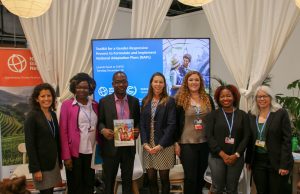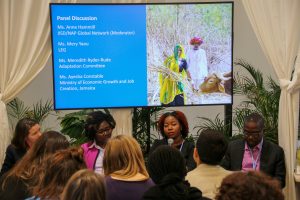
Gender-responsive climate action was high on the agenda at COP 25 in Madrid, with the agreement of the enhanced Lima work programme on gender, along with the renewed Gender Action Plan (GAP). As in recent years, a dedicated Gender Day was organized on Tuesday, December 10th, to highlight women’s leadership and raise awareness on the importance of gender-responsive climate policy and action.
On Gender Day, the NAP Global Network, in partnership with the UNFCCC Least Developed Countries Expert Group (LEG) and Adaptation Committee (AC), launched a new toolkit to support country efforts in pursuing a gender-responsive National Adaptation Plan (NAP) process.
The event was moderated by Kénel Delusca, Vice-Chair of the LEG, who highlighted the importance of integrating gender in NAP processes and noted that this has been a long-time priority for the LEG, with gender considerations being integrated in the LEG’s 2014 Technical Guidelines for the NAP Process, which the toolkit supplements and builds upon.
Angie Dazé, from the NAP Global Network Secretariat, provided an overview of the toolkit, noting that it provides NAP teams and stakeholders with flexible guidance, supported by key tools and resources, to adopt gender-responsive approaches throughout the NAP process.
Anne Hammill, Senior Director of Resilience at IISD, facilitated a panel discussion, exploring opportunities to apply the toolkit in different country contexts and with assistance from different support programs.

Mery Yaou, a member of the LEG from Togo, discussed the expert group’s work on gender and NAP processes to date and highlighted some of the good practices that will facilitate the application of the toolkit through the coordination of government actors, development partners and stakeholders. She noted that because the impacts of climate change are not gender-neutral, addressing these impacts must be gender-responsive.
Meredith Ryder-Rude, gender focal point for the AC from the United States, noted that the committee has endeavoured to integrate gender in all of their activities, and the toolkit is one example of the efforts that have been made to promote gender-responsive adaptation.
Ayesha Constable of the Ministry of Economic Growth and Job Creation in Jamaica described how the NAP process has enabled a more strategic approach to link gender and adaptation in her country led by the Ministry of Economic Growth and Job Creation, including efforts to promote collaboration between gender and climate change focal points in different government institutions.
Following an exchange with the audience, Maria del Pilar Bueno, Co-Chair of the AC, provided closing remarks, highlighting the AC’s plans for supporting application of the toolkit in 2020.

NAP processes are a clear opportunity to drive gender-responsive climate action, a key goal of the updated GAP. The toolkit provides a practical resource for countries to realize this ambition, while also helping to ensure that adaptation actions are inclusive and that investments yield gender-equitable benefits.
Download the Toolkit for a Gender-Responsive Process to Formulate and Implement NAPs.
Read more about our work on gender-responsive NAP processes.